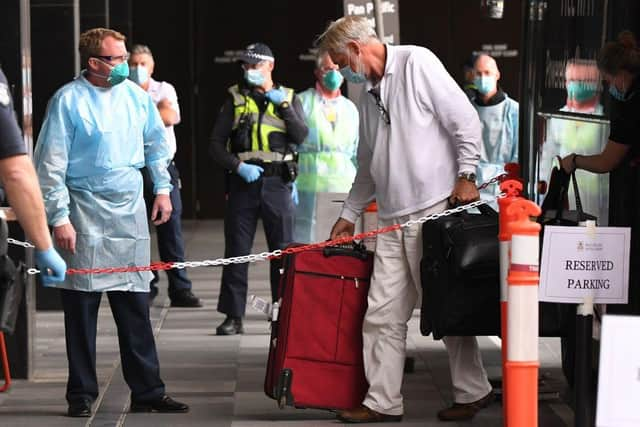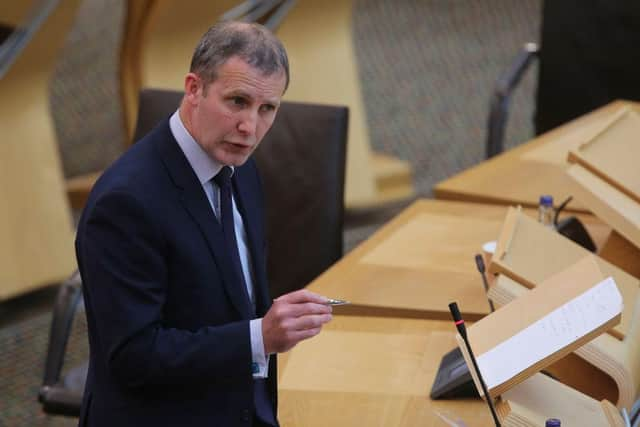Scottish Government planning introduction of ‘quarantine hotels’ to prevent spread of coronavirus from overseas
and live on Freeview channel 276
Speaking on Good Morning Scotland, Transport Secretary Michael Matheson said the proposals would force international arrivals “to self-isolate in a location designated for them for that period.”
Mr Matheson said Scotland’s second wave of Covid-19 in autumn 2020 had been driven by international travel.
Advertisement
Hide AdAdvertisement
Hide AdHe said quarantine hotels were being considered alongside a “suite of measures” that include an increase in contact tracing capacity, as well as a re-evaluation of travel exemption rules.
Last week, the First Minister said there were “all sorts of practical issues” with quarantine hotels - including the question of who would pay for them.
Australia and New Zealand have run quarantine hotels, paid for by the self-isolating guests, since the start of the pandemic.
It comes after public health experts warned that failure to act could lead to repeated cycles of lockdowns if international travel was not better regulated.
Advertisement
Hide AdAdvertisement
Hide AdLast week, Professor of public health Linda Bauld called for the Scottish Government to impose “supervised quarantine” for overseas arrivals, calling the current system an “Achilles heel” for the nation’s struggle to lower coronavirus cases.


“We made huge progress in the summer, got cases really low, and then we brought more of the virus back into the country from people going overseas during the summer break - and of course, they were permitted to do so.
“Our quarantine is not sufficient,” she told the BBC.
“We need supervised quarantine, I think, we need to look at what Australia, Taiwan, Vietnam and other countries have done.”
Scotland’s hospitals are currently treating a record number of Covid-19 patients.


Advertisement
Hide AdAdvertisement
Hide AdMore than 2,000 Scots are being treated in hospital for the virus, with almost 150 of them in the country’s intensive care units.
At the same time, it is understood that UK Government officials have been told to prepare for the creation of quarantine hotels for overseas arrivals.
According to The Sunday Times, Downing Street hopes to use GPS and facial recognition software to monitor people’s movements.
Foreign secretary Dominic Raab said the Government was considering a variety of options “in the round”, telling The Andrew Marr Show on BBC One this morning: "We are going to be strengthening the checks at the border as well as changing the rules, we are also making sure that we beef up the capacity to make those checks."
Advertisement
Hide AdAdvertisement
Hide AdMr Matheson also said he believed pre-departure testing - which would allow international passengers to prove they were not infected with coronavirus before travelling - would become standard procedure later this year.
“However, I don't think it's the end of the story,” he said, admitting that travel rules were “difficult to predict.”
His comments come as the UK’s ban on quarantine-free travel into the UK came into force today.
It is hoped the move will keep out new coronavirus strains – such as those which have been discovered in Brazil and South Africa.
Advertisement
Hide AdAdvertisement
Hide AdThe new rules mean arrivals from every destination will need to self-isolate for 10 days, or receive a negative result from a coronavirus test taken at least five days after their arrival.
Passengers flying in from overseas now also have to test negative before travelling.
A message from the Editor:
Thank you for reading this article. We're more reliant on your support than ever as the shift in consumer habits brought about by coronavirus impacts our advertisers.
If you haven't already, please consider supporting our trusted, fact-checked journalism by taking out a digital subscription.
Comment Guidelines
National World encourages reader discussion on our stories. User feedback, insights and back-and-forth exchanges add a rich layer of context to reporting. Please review our Community Guidelines before commenting.